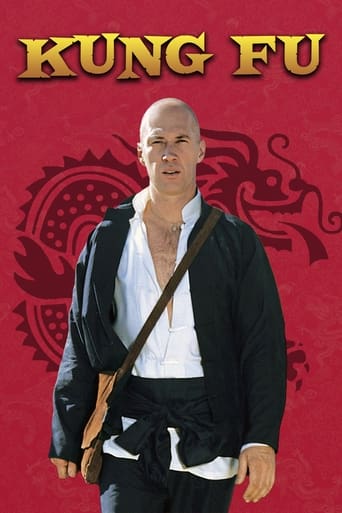

This is definitely not for people who are Trump supporters. Any character who rejects gold and seeks no control or power over others is just the spiritual sort who puts the Kibosh on everything Trump.More over the spiritual values demonstrated in this series show the emptiness of the Evangelicals, and the NRA. All the previous reviews are all agreed and I need to add nothing. The only lasting question for me is how is it possible that Bruce Lee would improve this. Lee would need to be a far better actor than I think of him to pull this off and offer the same quality experience. Having the Kung Fu sections be "more precise" would simply not add anything, since only an expert like Lee would even notice.
... View MoreI think the original 'Kung Fu' was the best show ever on t.v. It was wonderfully made, superbly acted and taught me so many wonderful lessons. I truly was (o.k. still am) in love with David Carradine's 'Kwai Chang Caine'. No man can hold a candle to him. He was the perfect man. Beautiful, gentle yet strong, kind, insightful, skilled...at practically everything. What gentle, kind men were Master's Po and Khan as well....and I believe if there were more programs like 'Kung Fu' on t.v. the world would be a much better place. I still watch my old tapes of the show and am now going to buy the DVD sets. The show is timeless and the scenery was great too. The movie? A must see. David Carradine is thee greatest actor to ever grace us with his magnificent presence.~I love you David~~ Your Inner Beauty Changed My Life ~
... View MoreThis will always be one of the more original series to come out of the 1970's. Imagine a Western where the main character is half Chinese and half Caucasian and doesn't use a gun. Now think of how this series wound up as one of the great cult classics of its era. Even though this series originally was the idea of Bruce Lee and would have featured him as the star, David Carradine still pulls off the job and comes off as very believable as Caine. You also can see that he tries not to play to stereotype, but he does make this show very mystical, which can be seen as a positive and as a negative. Also wonderful were Keye Luke as master Po, Phllip Ahn as master Kahn and, of course, Radames Pera as the young Caine. This show will always be a cult classic of its era.
... View MoreJust finished watching disc 1. This show still holds up today. OK more modern technology would make the shots appear better but the story, acting, editing...all awesome. I loved this series it was a major influence in my life as a child. I can't wait to finish the rest of Season 1. The "Extras" on the disc are sort of lame. I guess if you never saw the show or aren't really a fan then they serve a purpose but I know all this stuff already. I'd love to have a version with running commentary from David Carradine underneath. Carradine has allegedly been requesting more interesting "extras" for the season 2 disc like a taped dinner party of some key participants and others speaking to how the series influenced their lives, like Tarintino and his Kill Bill films. I adore David Carradine as an actor I'd listen to him talk about just about anything.So when is Season 2 released?
... View More